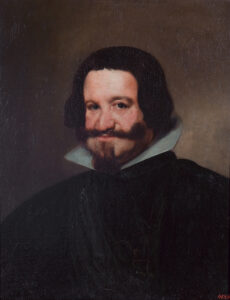The neuropsychiatric syndrome that may have affected the Conde Duque de Olivares, who in the early seventeenth century had almost absolute power in deciding internal or foreign affairs of the Spanish Kingdom.

Gaspar de Guzman, Count-Duke Olivares *oil on canvas *67 x 54,5 cm *circa 1638
BY DOMENICO INZITARI, MD, AND VLADIMIR HACHINSKI, MD, DSC
Early in the seventeenth century, France and Spain vied for predominance, led by Cardinal Richelieu (Armand Jean du Plessis de Richelieu,1585-1642) and the Conde Duque de Olivares (Gaspar de Guzmán y Pimentel, 1587-1645) respectively. Gregorio Marañon y Posadillo (1887-1960), founder of Spanish endocrinology, documented in a now classic biography manic depressive swings in the mood of Olivares. Temper and behavior disorders were also reported by other contemporary or modern biographists. We decoded, translated, and examined a secret report of a Medici family’s (Grand Dukes of Tuscany, Italy, at that time) representative in the Spanish Court, extant as original manuscript in the State Archives of the city of Florence, Italy. There, it affirmed that he had an unhealthy mind, and reported about continuous and large movements affecting his body.
We suggest that the likeliest explanation of these abnormal movements in someone with episodic mood swings is Tourette Syndrome, a recognized association.
Ancient and modern history provide examples of individuals capable of changing the destinies of the world, particularly if they gained absolute power in ruling a nation. When a ruler becomes an “Enlightened Prince,” outlined by Machiavelli (Niccolò di Bernardo dei Machiavelli, 1469-1512) it can be a favorable situation. However, when a ruler’s political decisions are influenced by an abnormal personality or a definite neurological disorder, the results might be disastrous.
In this article, we discuss the neuropsychiatric syndrome that may have affected the Conde Duque de Olivares, who in the early seventeenth century had almost absolute power in deciding internal or foreign affairs of the Spanish Kingdom, and was possibly affected by the Tourette Syndrome. The presence of personality traits linked with this neurological disorder may have had a role in Spain’s struggle with France for the domination of Europe.
In addition to the Monanni’s Dispatch, we drew the information for describing the syndrome presented by Olivares from two modern Olivares’ biographies, the one of Dr. Gregorio Marañon1, a Spanish endocrinologist, and the other of the eminent historian John Huxtable Elliot (1930-2022)2. Another source was a book, in which the same Elliot compared Cardinal Richelieu with Olivares3.
Historical Background
In 1621, King Philip III of Spain died, and Philip IV, a boy of 16 left the effective power of kingship in the hands of his former gentleman of the chamber, the Conde Duque de Olivares. Court favorite and prime minister since 1623, Olivares governed Spain with almost absolute authority for nearly 20 years. He embarked on a policy of uniting what he considered Spain’s anachronistic division of kingdoms, which ultimately led to revolts in the 1640s. He involved Spain in the Thirty Years’ War to establish Spanish-Austrian Habsburg domination of Europe.5 This plan was in opposition to those of the French plenipotentiary during the reign of Louis XIII, Cardinal Richelieu, who was also strongly determined to reaffirm the role of France as a great international power. The struggle was conducted by these two men on both diplomatic and military grounds. After alternating vicissitudes, it ended with the success of France and Cardinal Richelieu, and the defeat of Spain and Olivares.
The Disorders of Mood
Monanni4 reported about Olivares: “It is said he has an unhealthy mind, as since he was young, he had clear episodes of insanity, for which he had to be cured.”
Marañon1 described Olivares as the typical cyclothymic personality. Elliot3 confirms Marañon observations: “Moments of euphoria were succeeded by dark periods of discouragement, and both moods may indeed have run to the extremes.” Adverse events such as political failures or attacks by his opponents made him feel defeated and depressed. However, once these feelings abated, he found courage, vigor, and willingness to plan new enterprises and machinations (Contarini, quoted by Marañon).
Depressive phases were characterized by frustration, feelings of sin, fugues. On the other hand, he displayed an inclination for grandiose designs; especially in the first years of power, there was a phase of continuous hypomanic excitement.1
The Movement Disorder
Despite the detailed description of the physical and psychopathological traits of Olivares, Marañon’s biography did not mention any motor abnormalities. In contrast, Monanni’s Dispatch4 includes a brief description of involuntary movements “continuous and large, affecting his body, that is, his hands, head, and legs, while dealing with the most important affairs with his ministers.”
The Temper and Behavioral Disorders
In a background of long-lasting mood oscillations, character instability, and irritability are also reported: Monanni4 describes his character as often mutable, “so that it is impossible to be in sympathy with him.” Based on other contemporary accounts, Elliot writes2,3 that “Olivares suffered from acute hypersensitivity … was prone to sudden, terrifying bursts of temper … he lost his temper with people, with events, with fortune, with himself … he indulged in long tirades, and banged the table in outbursts of fury, although he could be affable, smooth, and indeed ingratiating in private conversations.” According to Marañon1, Olivares inherited from his father the irascible character, excessive meticulousness, and prolixity in details, traits that are typical of an obsessive personality. Marañon also notes that character abnormalities were reported in several other members of the family.
Interpretation of the Neuropsychiatric Syndrome
The available description of abnormal movements is too short for any definition based exclusively on the features of the motor disorder. So, the clinical interpretation can be made considering the whole neuropsychiatric picture. Movements were large and continuous, and supposedly activated by emotional stress (“when dealing with the most important affairs with his ministers”). The possible diagnoses include chorea, torsion dystonia, tics, and other complex involuntary movements that are commonly considered distinct from tics such as stereotypes, hyperekplexia, akathitic movements, and that can occur in the restless legs syndrome.6
Huntington’s disease should be excluded, owing to the absence of any ancestor affected, and of mental deterioration till the late years of Olivares’ life, although death occurred when he was only 58. Hereditary nonprogressive chorea of early onset, although rare, should also be considered. Another possibility is torsion dystonia: We can only postulate that torsion dystonia with the continual hyperkinesia usually twisting in pattern, and the sustained abnormal postures should have been so functionally disabling, to be not easily missed by the Olivares’ biographists.
We suggest that the association of involuntary movements with the typical personality and character traits is the strongest support of the hypothesis of Tourette Syndrome.
Compared with the general population, individuals with Tourette Syndrome appear to have an increased frequency of many different behavioral symptoms, including impulsivity and emotional lability6, anger, and short temper.7 Obsessional compulsive symptoms in particular have received close attention6. It has long been established that there are links between obsessive-compulsive disorder and depressive illness. Depression and anxiety scores are higher among Tourette Syndrome patients compared to normal controls.8 Among patients with Tourette Syndrome, Comings & Comings7 have found an increased prevalence of phobias and panic attacks, obsessions and compulsions, depression, and mania. These authors conclude that all of these psychopathological abnormalities may be linked to a common genetic disorder causing disinhibition of the limbic system.
Conclusions
Although the role of Olivares in relation to the decline of Spain in the seventeenth century is controversial, many clues from contemporary observers and modern historians suggest that his psychological traits undoubtedly influenced his political decisions.
The presence of involuntary movements associated with psychopathologic features commonly observed in Tourette Syndrome make this diagnosis plausible.
Acknowledgments
We thank Dr. Francesco De Feo, Egle Casale Inzitari and Marco Inzitari for their assistance in decoding and translating the Monanni’s Dispatch. •
Domenico Inzitari is with the Italian National Research Council, Neuroscience Institute, Sesto Fiorentino, Florence, Italy. Vladimir Hachinski is with the Department of Clinical Neurological Sciences, Robarts Research Institute, University of Western Ontario, London, Canada, and is a past president of the WFN.
This article represents the opinions and interpretations of the authors and does not necessarily reflect the opinion of the WFN.
References
1. Marañon G. El Conde-Duque de Olivares. 3rd Edition, Madrid, 1952.
2. Elliot JH. The Count Duke of Olivares. Yale University Press, New Haven and London, 2nd Printing, 1988.
3. Elliot JH. Richielieu and Olivares. Cambridge University Press, Cambridge, 3rd Printing, 1987.
4. Monanni B. Monanni’s Dispatch. Mediceo, filza 4963, 14 Nov 1637, State Archives, Florence.
5. The New Encyclopaedia Britannica. Olivares Conde-Duque de. Micropaedia 1984; vol. VII, p.520.
6. The Tourette Syndrome Classification Study Group. Definition and Classification of Tic Disorders. Arch Neurol 1993; 50: 1013-1016.
7. Comings D, Comings B. A controlled study of Tourette Syndrome I-VII. Am J Hum Gen 1987; 41: 701-866.
8. Robertson MM, Shelley C, Baker J, Flynn D. The psychopathology of Gilles de la Tourette’s Syndrome. A Controlled study. Br J Psychiatry 1993; 162: 114-117.
